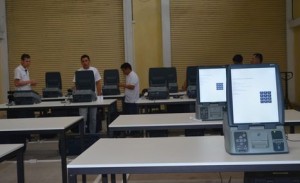The Ecuadorian National Electoral Council (CNE) conducted a workshop during the first days of August to evaluate the completion of tasks and the results obtained from the e-voting pilot and the electoral operative plans executed in the country this year.
A national evaluation report is still in the works; it will present the scope of e-voting, the modernization project of the nation’s voter registry, and the annual operative plan.
The Ecuadorian Sectional Elections held on February 23, had as a fundamental purpose the testing of e-voting technologies in the provinces of Santo Domingo de los Tsáchilas and Azuay. These experiences will serve for later decision making during the upcoming elections, regarding the expansion of voting automation until the entire country is covered.

E-voting recognized by observers
Smartmatic participated successfully in Santo Domingo de los Tsáchilas, which was acknowledged by Unasur, and stated in their final report for the Ecuadorian Sectional Elections. The observation organism showed satisfaction over the system’s performance, its protection of the secrecy of the vote, its problem resolution mechanisms and in general, over it having met the objectives of automating the vote and safekeeping the will of the people.
The Ecuadorian CNE has made clear that it will take into account the recommendations made by observers from missions of national and international observation bodies. The following aspects will be considered: an increasing development of inclusion programs, voting transparency (especially while voting at home), the voting of incarcerated individuals and technical audits.
Observers of the process showed their satisfaction as well. Roberto Rosario, president of the Inter-American Union of Electoral Bodies, stated that “in comparison to previous processes I have witnessed in Ecuador, I consider the current elections to be far superior, I think you have made an uncommon leap forward.”
In turn, Lázaro Cárdenas, Chief of the OAS Mission and former governor of Michoacán, Mexico, spoke of his experience: “we have found a normal [voting] process, we are also surprised with the investment on technology that is being made (for e-voting and voting at home) aimed at optimizing the process.”